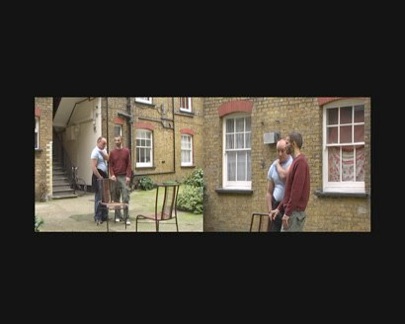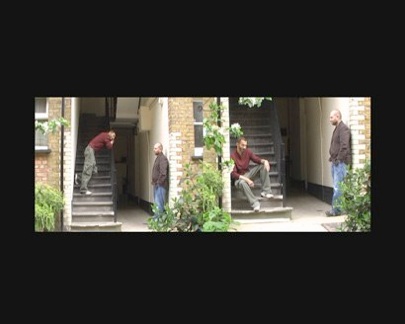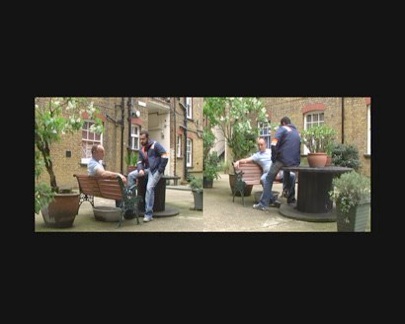MIRAR SEN QUE NADA RESPONDA
Looking but nothing looks back
2006, Spain /England, DVD, vídeo instalation, color, sound, 3’ 30’’.
Performer: Armand Arce, Gregg Boxall, Mark Ellis, Alain Haddad. Camera: Xoán Anleo. Edition: Roberto Martín Gálvez. Collaboration: Jorge Quintana Location: London. Premiere: Xoán Anleo. Mirar sen que nada responda, Galería Ad Hoc, Vigo, 2007.
In post-capitalist society, times of instability such as the present witness profound changes that alter the gravitational fields of human relations. An urgent need for identity redefines territory, personal space and relationships; communication undergoes constant modification and resettlement.
The city becomes a metonymic scene of citizen conflict. Social structure rests mainly on economics underpinned by a complex political and ideological matrix aimed at subtly generating stereotypes, at channelling and exploiting emotions and at filtering any process of metamorphosis.
This video portrays individuals as hieratic figures, devoid of gestural language, as symbolic representations of the tension residing within the subject’s relation to his environment. The absence of language points to a loss of memory both individual and collective. Against a backdrop of urban scenery, individual introspection emerges and is set against the reality of the claustrophobic and oppressive surroundings. Life corroded by the everyday is registered and visualised in the manner of cartography: an open map that shows the rupture between the self and others, between subjecthood and the space that contains it.
Man becomes an improbable ghost for whom time has been rendered immaterial, flowing in a relentless eternity, unable to locate a fixed point of reference. He finds himself obliged to explore the limits of his individuality, a process which generates a conflict between his intimacy / privacy and the space which surrounds him. This site of exchange places him on the edge of an abyss, subjects him to strong feelings of unease, leads him to evade reality, like a castaway in search of his own identity and transcendence. Only if he is able to maintain a critical distance with respect to society and, in his search for valid answers, free himself from the psychological fear of loss of identity, will he be able to recover his ethical dimension and emotional authenticity.



